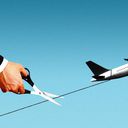Boeing's dual crises: How the pandemic has deepened its 737 MAX crunch

Published Date: 9/18/2020
Source: axios.com
The grounding of Boeing’s 737 MAX was the worst crisis in the plane-maker’s century-long history. At least until the global pandemic hit.Why it matters: Wall Street expects it will be cleared to fly again before year-end. Orders for what was once the company’s biggest moneymaker were expected to rebound after the ungrounding, but now the unprecedented slump in travel will dash airlines’ appetite for the MAX and any other new planes, analysts say — putting more pressure on the hard-hit company.Driving the news: The two 737 MAX crashes in Indonesia and Ethiopia that killed 346 people — and led to its worldwide grounding in March of last year — were front and center this week.Congress released a 238-page report outlining the “horrific culmination” of events that caused the crashes — laying blame on Boeing and its key regulator, the FAA.The report isn’t expected to delay the plane’s return to service, as Fitch Ratings wrote in a report out this week.Boeing has conducted test flights in recent months to demonstrate the beleaguered jet is safe to fly. The FAA's OK that the plane can return to the skies would likely prompt other countries to follow suit.The state of play: The company has over 450 737 MAX jets in the hopper to be delivered, with a total of 4,117 planes ordered by airlines as of late last month, according to Fitch.But order cancellations are piling up. The pandemic has introduced a new reality — scrapped orders have consistently outpaced new orders.While Boeing is expecting some windfall when they're cleared to restart deliveries, as customers pay a healthy chunk when they place the order, the majority of payment comes upon delivery.And even if customers don't outright cancel prior 737 MAX orders, airlines will "negotiate really hard to defer those deliveries" — pushing off payment to Boeing, says Cai von Rumohr, a Cowen analyst who's followed the industry for 50 years.The big picture: Airlines are facing such a severe drop-off in travel demand that previous needs for additional planes have disappeared. Even their current inventory isn’t fully utilized.Air New Zealand said this week it would store its entire Boeing 777 fleet until September of next year because of the pandemic. Delta has announced a similar measure.That’s bad news for Boeing, “which makes a long list of spare and replacement parts and components and sells them to airlines to keep the big airplanes in the air,” as the Puget Sound Business Journal reports.Between the lines: Some deliveries of the 787 Dreamliner — its other popular plane — have slowed after the company disclosed manufacturing issues and was forced to conduct inspections, the New York Times reported earlier this month.Even with those troubles aside, demand for that plane is expected to wane."787 customers don't need to have more 787 planes. International travel is still down by 90%," von Rumohr tells Axios.The bottom line: When the 737 MAX was grounded, there were questions about whether customers would ever feel safe flying on the plane again. The question has morphed into: How long will it be before customers fly again, period.Boeing will weather the crisis. It withdrew its plea for federal funds, but loaded up on debt and raised billions in the public market after the Federal Reserve stepped in to shore up credit markets early in the crisis.